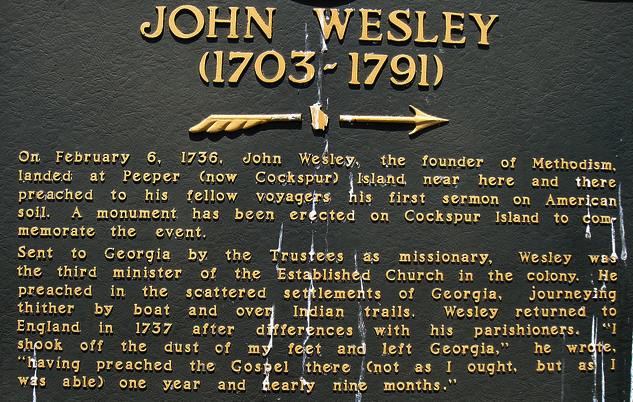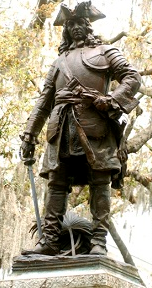 E
Educated at Oxford,
James Oglethorpe joined the Austrian army at age 17 to fight in the
Austro-Turkish War 1716-1718.
He served under
Prince Eugene of Savoy to free Belgrade, Serbia, from
Muslim Turkish control.
 At age 21, he returned to England
At age 21, he returned to England. He unintentionally killed a man in a brawl and went to prison.
Upon release,
Oglethorpe followed his father's footsteps and began to serve in Parliament in 1722.

He opposed slavery and, as a result of a friend dying in
debtors' prison, he championed prison reform.
 James Oglethorpe
James Oglethorpe had the idea for a colony where poor debtors and religious refugees could get a second chance. He named it after
King George II.
 Georgia's Colonial Charter
Georgia's Colonial Charter, 1732, stated regarding religious freedom:
"There shall be a liberty of conscience allowed in the worship of
God...
and that all such persons, except papists, shall have a free exercise of their religion."

Sailing on the ship 'Ann', the 115 settlers landed on JANUARY 13, 1733.
A year later,
Protestant refugees from Salzburg, Austria, called "Salzburgers," settled the town of Ebenezer, Georgia.

In 1735,
Moravian immigrants from Bohemia arrived through Fort Argyle.
 Scotch Presbyterians
Scotch Presbyterians arrived from New Inverness in 1736.
Huguenot Protestant refugees had arrived from France.
 James Oglethorpe's secretary was Charles Wesley
James Oglethorpe's secretary was Charles Wesley, who later became a hymn writer, composing the carol, "Hark, the Herald Angel Sings."

Charles Wesley's brother,
John Wesley, served in 1735 as the colony's Anglican minister. He later began the Methodist movement.

The Wesleys' friend,
Rev. George Whitefield, preached to enthusiastic crowds in Georgia in 1738.
Get the book THE ORIGINAL 13-A Documentary History of Religion in America's First Thirteen StatesOn July 11, 1733,
34 Portuguese Sephardic Jews and 8 German Ashkenazic Jews, arrived in
Savannah, Georgia. This was the largest group of Jews to land in North America prior to the Revolutionary War.

They began the Holy Congregation Hope of Israel-"Kahal Kodesh Mickve Israel,"
the third oldest Jewish congregation in the United States. 
In 1742, during the
War of Jenkin's Ear, some
3,000 Spanish soldiers landed on Georgia's St. Simon's Island.

Oglethorpe repelled them in the
Battle of Bloody Marsh.
In 1758, the British government issued an Act "for establishing Religious Worship therein, according to the Rites and Ceremonies of the Church of England."

This Act established the Anglican Church as the colony's official denomination, with a £25 per annum salary for every Anglican clergyman. Catholics were excluded from the colony.

When
400 French Catholics were driven out of Acadia, Canada, by the British, they sought shelter in Savannah, Georgia, but were only allowed to stay the winter before ordered to leave.

Some Catholics traveled to South Carolina, some St. Dominique Island, and some to Louisiana in 1765, where the pronunciation of
"Acadian" evolved to "Cajun."  THE ORIGINAL 13-A Documentary History of Religion in America's First Thirteen States
THE ORIGINAL 13-A Documentary History of Religion in America's First Thirteen StatesIn 1772, Daniel Marshall established the
first Baptist Church in Georgia. 
The Revolution saw many Georgian heroes, such as
Nancy Hart. While her husband was away, six British soldiers converged on their frontier home.

They shot her prize gobbler and ordered her to cook it. After feeding and serving them lots of wine she grabbed one of their guns, promising to shoot the first one that moved.

After shooting two, her husband showed up and they hung the rest.

Georgia is also known for
Polish General Casmir Pulaski, who died fighting the British at Savannah.
 Mordecai Sheftall
Mordecai Sheftall of Georgia became the Continental Army's highest ranking Jewish officer.
In 1777, Georgia passed its
first State Constitution, stating:
"We the people of
Georgia, relying upon the protection and guidance of
Almighty God, do ordain and establish this Constitution."
 Georgia's Constitution
Georgia's Constitution, 1777, Article 6 stated:
"Representatives shall be chosen out of the residents in each county...and they shall be of the Protestant religion."
In 1788, Georgia was the 4th State to ratify the U.S. Constitution.

In 1789, Georgia's population was over 82,000 and the State adopted
a second Constitution which removed the Protestant requirement, simply stating:
"All persons shall have the free exercise of religion."A third Georgia Constitution was adopted in 1798, establishing religious toleration.

In the first 34 years of Georgia's statehood, conflicts arose between settlers and Indians, especially after gold was discovered on Cherokee land.

An Indian Removal Act was hurriedly rushed through a Democrat controlled Congress in 1830.
This resulted in the tragic "Trail of Tears" where over 4,000 Indian men, women, and children died in the bitter winter of 1838 as the Federal Government forcibly marched them from Georgia and southeastern United States to the Oklahoma Territory.

Georgia's religious history included the
Jewsish Mickve Israel Congregation, which in 1786 had an attendance of 73. In 1790, Georgia's Governor granted the congregation a State Charter.

President Washington wrote to them:
"May the same wonder-working Deity, who long since delivered the Hebrews from their Egyptian oppressors, planted them in the promised land, whose Providential Agency has lately been conspicuous in establishing these United States as an independent nation, still continue to water them with the dews of Heaven, and make the inhabitants of every denomination partake in the temporal and spiritual blessings of that people, whose God is Jehovah."

The first Catholics moved into Georgia from Maryland around 1793.
They had no priest until the French Revolution sparked a slave revolt on the Island of St. Dominique/Haiti causing a few priests to flee to Georgia.
In 1810, the State Legislature incorporated the Catholic Church of Augusta.

In 1820, Irish Bishop John England was appointed over the State's one hundred Catholics in Savannah and fewer in Augusta.
Bishop John England founded America's first Catholic newspaper, "The United States Catholic Miscellany."
Bishop John England delivered the first Catholic Sermon in the U.S. Capital at the Sunday morning Church service held in the House of Representatives, January 8, 1826.

The overflow audience included President John Quincy Adams, who had previously stated, July 4, 1821, that Catholicism and Republicanism were incompatible.
Bishop John England stated:
"We do not believe that God gave to the Church any power to interfere with our civil rights, or our civil concerns... I would not allow to the Pope, or to any bishop of our Church...the smallest interference with the humblest vote at our most insignificant balloting box."

By 1839, Bishop John England listed 11 priests in Georgia.
The population of Georgia in 1830 was 516,823.
In 1836, Methodists founded Emory College at Oxford and Wesleyan Female College at Macon - the first institution of learning founded specifically for women in America.

Georgia supported the State's Right doctrine before the outbreak of the Civil War, and when Lincoln was elected, politicians moved for secession from the Union.

Georgia was devastated during the War, especially in the fall of Atlanta and General Sherman's march to the sea.

In 1865, Atlanta University was founded by the Protestant American Missionary Association to help freed slaves, as was Clark University, founded in 1869 by the Methodist Episcopal Church.
The population of Georgia in 1870 was 1,184,109.

In 1877, Georgia's Constitution stated:
"Relying upon the protection and guidance of Almighty God...
All men have the natural and inalienable right to worship God, each according to the dictates of his own conscience."
In 1877, Baptists founded Shorter College at Rome, and in 1881, Methodists founded Morris Brown College.

In 1895, history was made at the International Exposition in Atlanta when Tuskegee President Booker T. Washington spoke.
In 1900, the population of Georgia was 2,216,331.
As of 1910, the State of Georgia gave full liberty of conscience in matters of religious opinion and worship, but did not legalize willful or profane scoffing.
It was unlawful to conduct any secular business on Sunday. Oaths were administered with one hand upon the Bible and the other uplifted, with the affirmation:
"You do solemnly swear in the presence of the ever living God" or "You do sincerely and truly affirm, etc."
Legislative sessions are opened with prayer.

The U.S. Religious Landscape Survey, conducted by The Pew Forum on Religion & Public Life, 2007, published in the USA Today, listed Georgia as:
83 percent Christian, consisting of:
-Evangelical Protestant - 38 percent
-Mainline Protestant - 16 percent
-Black Protestant - 16 percent
-Catholic - 12 percent
-Orthodox - <0.5 percent
-Other Christian - <0.5 percent
1 percent - Jewish
<0.5 percent - Mormon
<0.5 percent - Jehovah's Witnesses
<0.5 percent - Muslim
<0.5 percent - Buddhist
<0.5 percent - Hindu
<0.5 percent - Other World Religions
<0.5 percent - Other Faiths
<0.5 percent - Did not answer
12 percent - Unaffiliated

As James Oglethorpe and the first settlers touched Georgia's shore, JANUARY 13, 1733, they knelt and Rev. Herbert Henry offered prayer.
They declared:
"Our end in leaving our native country is not to gain riches and honor, but singly this: to live wholly to the glory of God."
Their object was: "To make Georgia a religious colony."
 Three SECULAR Reasons Why America Should be Under GodSearch AMERICAN MINUTE archives
Three SECULAR Reasons Why America Should be Under GodSearch AMERICAN MINUTE archives